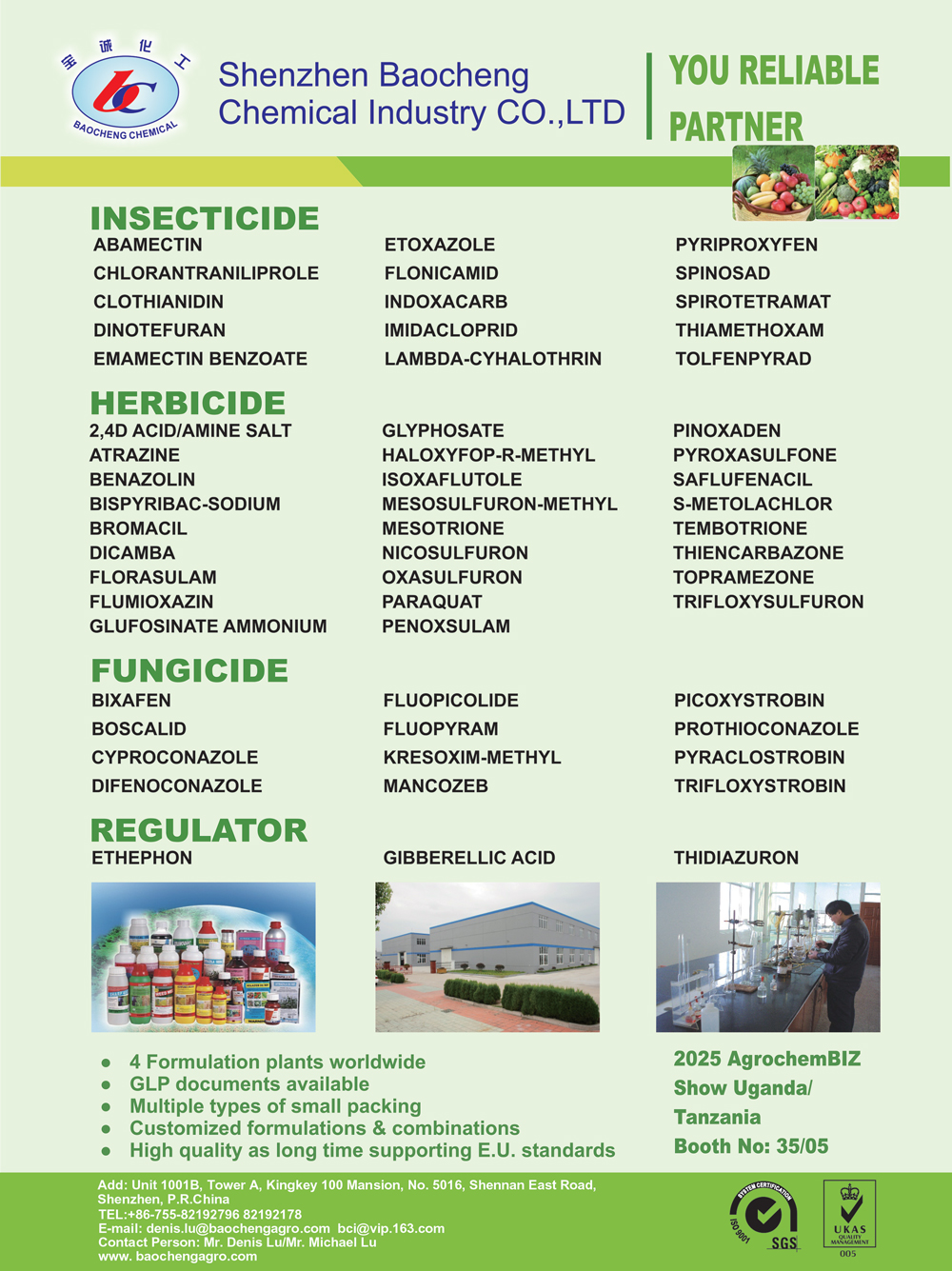From The Editor
Scroll Down to Read
 |
Renee Targos Editor |
Doing Business in Brazil
With commodity prices low, Brazilian growers decreased spending on crop inputs in 2024, and the crop protection industry took financial hits. Now crop protection companies are dealing with the aftermath through bankruptcies, layoffs, and cutbacks—but there are some areas of hope and growth.
Fabio Kagi, Institutional and Regulatory Affairs Manager for SINDIVEG, an association supporting 23 crop protection companies in Brazil says the biologicals market continues to show growth.
“Biological control products have been in the market for a while now. But only in the past few years we´ve noticed an exponential growth, which can be attributed to a mix society demands, developments in agricultural research, financial investments, increase in products shelf life and others,” says Kagi.
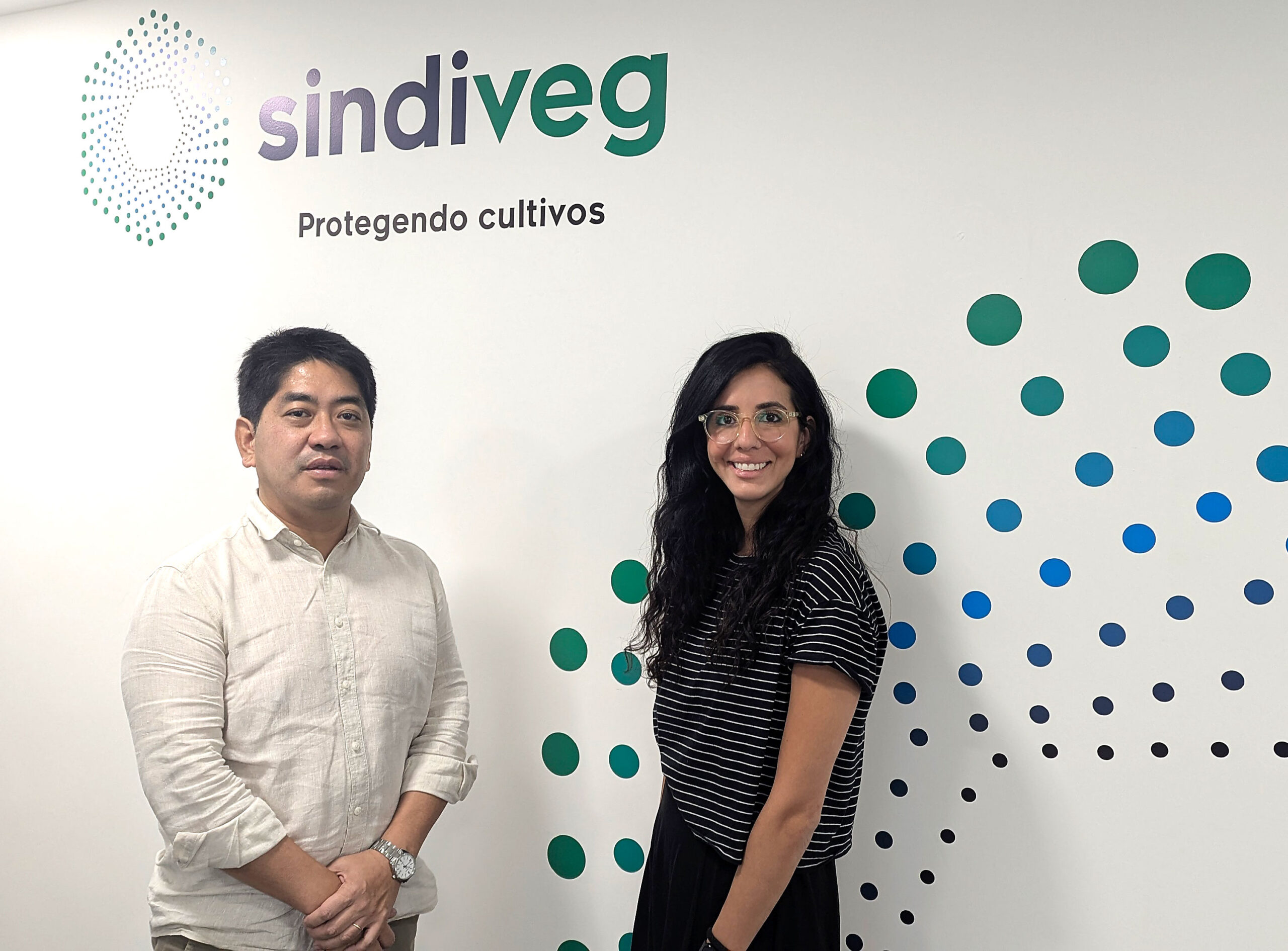
Fabio Kagi, Institutional and Regulatory Affairs Manager and Soraia Pinho, Regulations Analyst for SINDIVEG
Kagi’s colleague, Soraia Pinho, Regulations Analyst for SINDIVEG, who works in supporting members offering biologicals is noticing the same trend.
“Companies involved in the plant protection products market need to be aware of this market trend. Therefore every company either now offers bioproducts in their portfolio or is analyzing the best moment and products to have,” says Pinho. “How fast this market will grow is now the question, but there is no doubt that this trend is here to stay. There should not be any dichotomy between chemicals or biologicals anymore. Both groups of products have their product market fit in modern agriculture.”

Amanda Bulgaro, Federal Regulation Manager, AENDA
Amanda Bulgaro works as the Federal Regulation Manager for AENDA (National Association of Phytosanitary Companies). AENDA represents 60 crop protection companies with half the members now offering biological products and other types of bioinputs.
One of the big wins last year for her association was the Bioinputs Law (Law 15.070/2024), sanctioned on December 24, 2024. AENDA, alongside other associations and producers, worked to get the new law passed for expediting bioinput product registration.
This new law opens many opportunities for companies pursuing bioinput product development. The Bioinputs Law regulates industries and growers that multiply microorganisms on the farm.
“The new law will encourage the development of the Brazilian bioinputs industry. The year of 2025 will be a year of hard work with the involvement of several entities that must work toward the regulation of the Bioinputs Law, uniting the vision of various sectors and professionals in agribusiness, mainly from the regulatory and legal sectors,” says Bulgaro.
The Microbial Solution
A part of the Bioinputs Law regulates microbials. Growers creating their own farm-made microbials bioinputs disrupted parts of the market due to efficacy issues.
For Rovensa Next Brazil, the law is an important step in the region’s bioinputs market and crucial to their work with microbials.
The Rovensa Next Global Biosolutions Research and Innovation Center, located in Hortolândia (São Paulo State), opened in 2022. Luis Cavalcante, Head of Rovensa Next Brazil, and Johana Rincones Perez, Global R&D Product Design Manager, lead of team of sales and researchers to find microbial formulations that work in Brazil’s varying climates as well as around the world.
Rincones says the new law helps to establish a standard to build trust with growers.
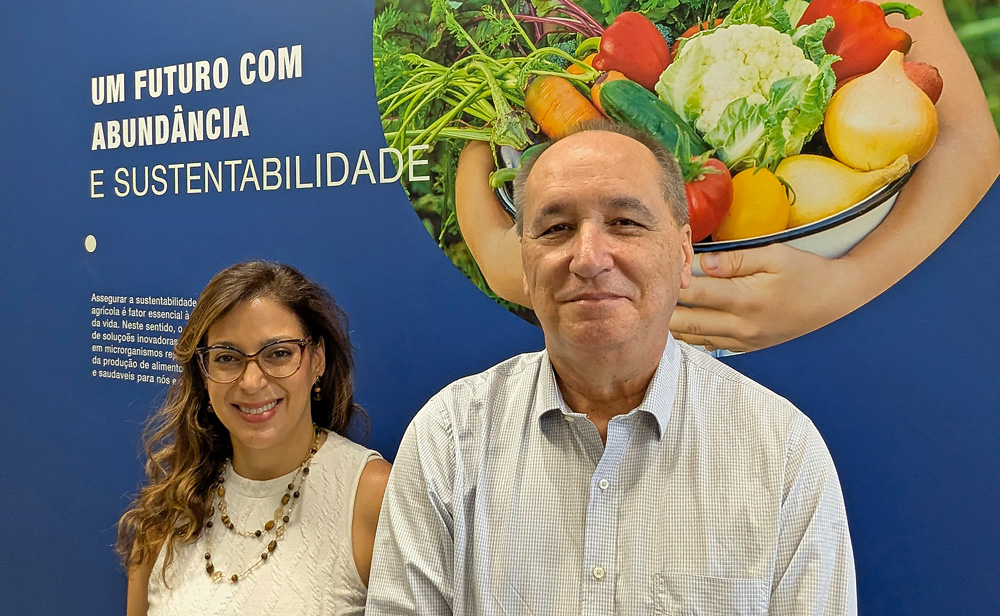
Johana Rincones Perez, Global R&D Product Design Manager and Luis Cavalcante, Head of Rovensa Next Brazil
“A microbe is never a product. A product is a microbe that is stable to use. It has a matrix in which it’s going to be applied and perform in the field,” says Rincones.
“A microbe produced on a farm, for instance, doesn’t have a formulation. They cannot guarantee that the microbe is going to perform because it doesn’t have rigor and testing to guarantee it. This tarnishes belief in our own products because maybe growers can acquire the same species or the same strain of microbe that we use in our formulations, but just because they have the same microbe, they don’t have the product.”
WATCH VIDEO: 〉〉 What Work Goes into Creating a Microbial Product? |
Troubling Watching? CLICK HERE
Rovensa Next is researching the use of microbials in biostimulants and biocontrol products, testing some formulations in more than 3,000 field trials. The work is worth the effort so products can take their place in an expanding Brazilian biological market.
“The biological market in Brazil is growing rapidly,” says Cavalcante. “This is a trend from many years. Biocontrol is increasing the most for soybeans. Soybeans are the main crop for Brazil, followed by corn, cotton, and sugarcane. We have many pests, which the chemical control is not enough.”
WATCH VIDEO: 〉〉 Luis Cavalcante from Rovensa Next Talks About Brazilian Biologicals Market |
Trouble Watching? CLICK HERE
Third-Party Proof
As more companies bring biological solutions to Brazil, the path through regulations and to market is improving with more available support. Contract research organizations, like Merieux Nutrisciences and Staphyt Brasil Agro Consultoria report an increase in clients with biological products, with Merieux at 20% and Staphyt at 50% of projects.
Merieux Nutrisciences recently increased the services offered to clients at its Piracicaba location. The site consists of 200 employees working in 10 laboratory buildings spread across a 6,500-square-meter campus. When the company opened in 1991, the company offered registration studies for plant protection products. Last year, they started offering field trials. This year, they added regulatory consultancy services.
Roberto Sardinha, International Sales Manager for Merieux Nutrisciences, says these additional services are due to trends his company is seeing in the Brazilian pesticide market. “This is a trend in the market because companies are focusing more and more on their core business, looking for cooperation with providers who can provide full solutions,” says Sardinha.
Sardinha is also seeing other trends.
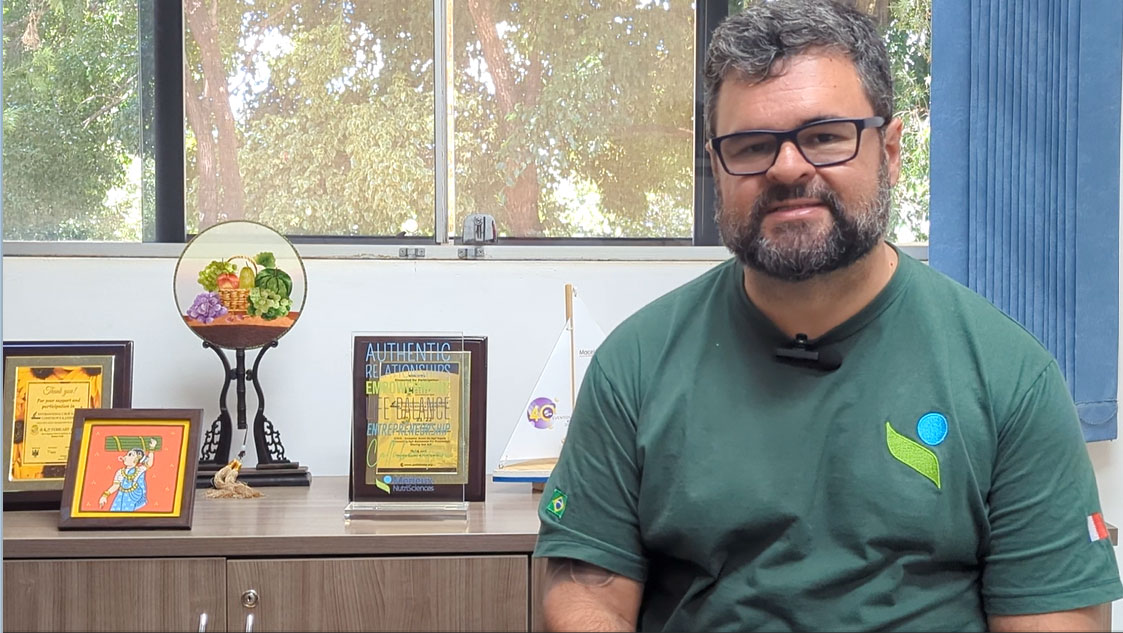
Roberto Sardinha, International Sales Manager for Merieux Nutrisciences
“Recently, we see a very strong movement of Chinese and Indian manufacturers coming by themselves to the Brazilian market with their own formulations,” says Sardinha.
“We also see an increase of biologicals coming from Brazilian companies and from companies from Central and North American countries. There are also Chinese and Indian manufacturers starting to develop their own biologicals as well.”
WATCH VIDEO: 〉〉 Roberto Sardinha Discusses Crop Protection Trends in Brazil? |
Trouble Watching?CLICK HERE
As companies come to Brazil and they need assistance with the country’s three regulatory agencies: MAPA (Ministry of Agriculture, Livestock, and Supply), ANVISA (National Health Surveillance Agency), and IBAMA (Brazilian Institute of Environment and Renewable Natural Resources).
Merieux Nutrisciences and Staphyt Brasil Agro Consultoria, Ltda., offer assistance to help companies create the right strategy.
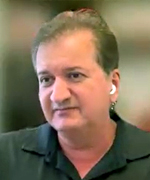
Dr. Luiz Antonio A. José Staphyt Brasil Agro Consultoria Ltda.
Dr. Luiz Antonio A. José, Head of Operations for Staphyt Brasil Agro Consultoria Ltda., says, “When you are seeking registration in Brazil, you need to define a strategy of where you want to go the market.”
With three research stations, Staphyt provides services that include field studies in south Brazil, Sao Paulo State, and northeast of Brazil, covering different environments and crops.
“When companies come from different places, they’re looking to better understand the activity of their products in Brazil,” says Jose. “I see Indian and Chinese companies exploring this market for bioproducts. It is growing very fast.”
One of the biggest opportunities for crop protection companies wanting to enter the Brazil market is to address nematodes. With Brazil’s rainfall and warm weather throughout the year, and with the previously used chemical products used to kill off nematodes being banned, the opportunity is open for both biologicals and synthetic crop protection products.
“After the government banned the main products from the market, the problem with nematodes spread in Brazil,” says Jose. “This opened the market for bioproducts to control nematodes.”
Currently, the majority of the biologicals used to control nematodes are microbials.
Getting to Market
Once companies get through registration, not knowing how to bring their products to market, is a common problem. The Brazilian crop protection market is restructuring with cooperatives taking 45% and dealers have 45% of the share, with top tier companies selling directly to the grower.
The sales tactics have changed with the entry of biologicals. Before companies could sell a product, now they need to have a relationship with grower or distributor and provide an educational component to teach growers about integrated management using both biologicals and synthetic crop protection products.
Alexandre Quesada, Founder of SmartTox, a contract research organization, opened 4Terra to assist companies entering the Brazilian market. Quesada says 4Terra provides registration services, but also commercial development, strategic consulting, and supply chain optimization.
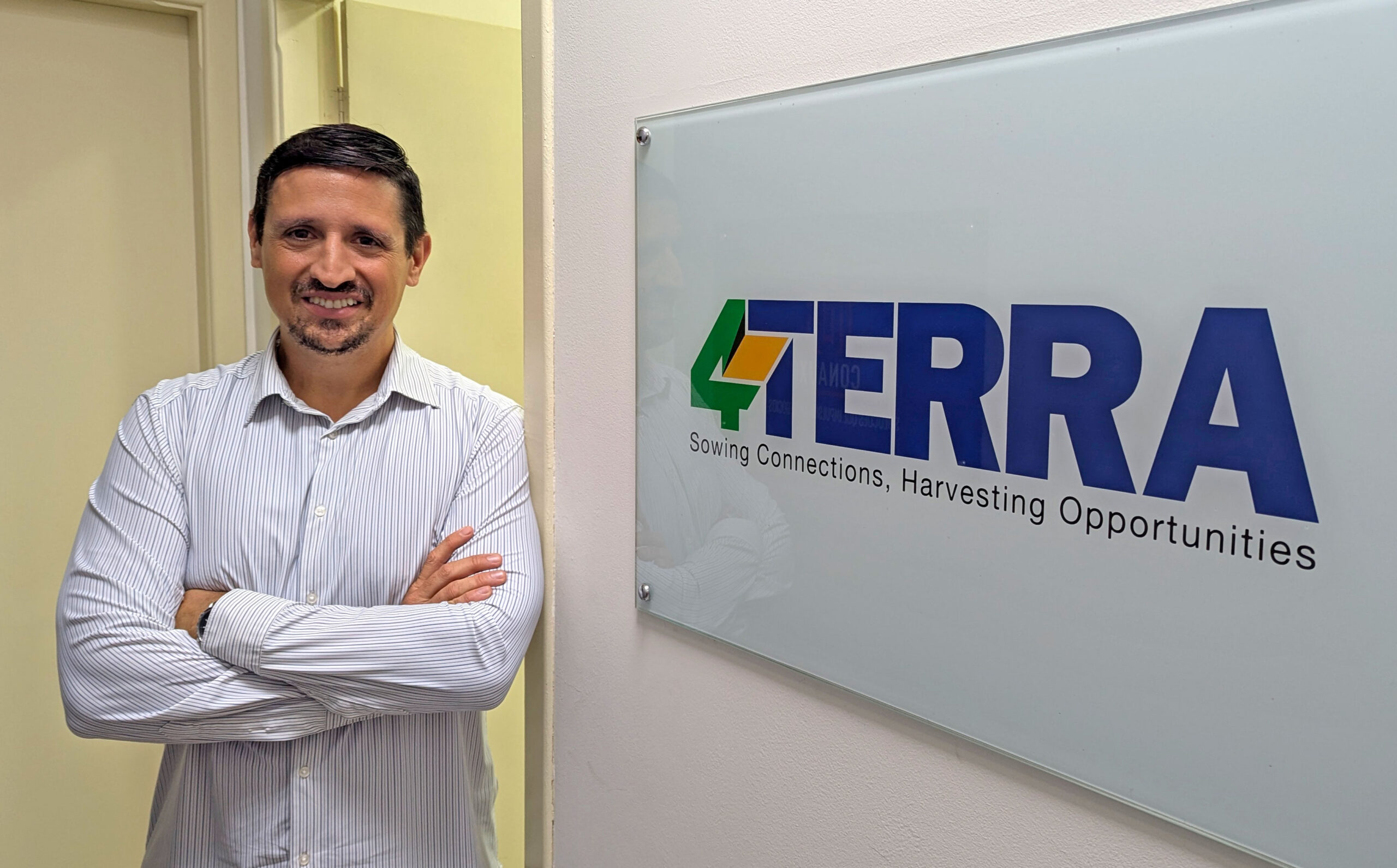
Alexandre Quesada, Founder of SmartTox and 4Terra, a strategic consulting firm.
“We act as a bridge between Chinese manufacturers and Brazilian importing companies. Our services include B2B sales of technical-grade active ingredients and formulated products, helping our clients maximize their market presence,” says Quesada.
“We also focus on enhancing operational efficiency by identifying bottlenecks in the supply chain and implementing solutions that facilitate smoother operations.”
Two big mistakes Quesada sees companies making when trying to enter the Brazilian crop protection market are:
Overlooking Local Legislation
“Many companies do not understand the rigorous registration and approval processes in Brazil, potentially leading to delays and unexpected costs,” says Quesada.
Underestimating the Importance of Local Relationships
“Some companies view local firms merely as paper presenters,” says Quesada. “They need to find partnerships that understand their unique needs and challenges, providing personalized advice to help navigate the registration process or to find the best path to market their products.”
Quesada says for companies wanting to do business in Brazil, look for partners that can handle regulatory steps efficiently and establish relationships with local suppliers and sales representatives for effective market penetration.
Room for Growth

Leticia Rossi, International Sales Consultant, Merieux Nutrisciences
With more companies bringing their biological products to Brazil, a question discussed in many company meetings is: Will the Brazilian market be oversaturated?
Leticia Rossi, International Sales Consultant for Merieux Nutrisciences, says, “There is still a lot of space. If you consider the market size of chemicals, then you see that for biologicals, it’s still totally open. We have crops growing throughout the year, so it’s important to have options for the grower, especially in terms of integrated pest management. Biocides are major part of IPM success.”
While the Brazilian crop protection market continues to face challenges, there are many positive shifts happening as far as opportunities, regulatory advancements, and supportive services to help companies recover and grow. •
